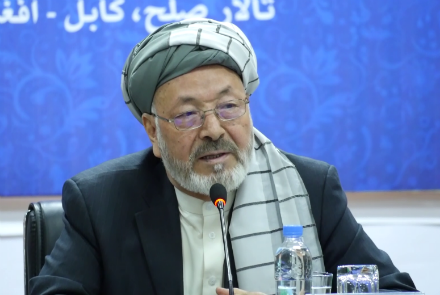The head of the High Peace Council, Mohammad Karim Khalili, said some members of the council have indirectly exchanged ideas with the Taliban leadership and have been told by the group’s leadership that war is not the solution for Afghanistan’s crisis.
Publish dateWednesday 17 October 2018 - 20:15
Story Code : 172683
Addressing a consultation meeting with political figures and parties on the peace process on Wednesday, Khalili said the Taliban leadership has reached the decision that war is not the answer.
“We have passed on our ideas and have got their ideas with the Taliban at different levels even with the leadership of the Taliban movement. All these have happened through mediation,” Khalili said.
Taliban has not however officially commented on the remarks.
The Hizb-e-Islami leader Gulbuddin Hekmatyar – who was also at the meeting – put forward some ideas regarding peace.
“An unconditional agreement (should be reached) between all involved parties in the conflict including foreign forces, government and armed oppositions; during the talks, the Jirga (assembly) should ask the parties to accept a ceasefire unconditionally; the start of negotiations (should begin) without any pre-conditions; no party and no one should put any conditions (on holding talks) which will stop the talks. Meanwhile, all parties should agree on the formation of an area where none of the parties have their forces,” Hekmatyar said.
The National Islamic Unity Party of Afghanistan meanwhile called on government to keep the doors open regarding all sectors during talks with the Taliban.
“If they (Taliban) want to talk on a government which is formed unilaterally, we are ready to talk on it. Naturally, a new formation will come into being. If they have any consideration for foreigners, the foreigners have come here through a process. The need for the withdrawal of foreign forces will be created if we come together and become united,” said Mohammad Mohaqeq, the head of the National Islamic Unity Party of Afghanistan and the second deputy chief executive of the National Unity Government.
Other issues such as rumors on the creation of an interim government and drawing up a roadmap for the withdrawal of foreign forces were also discussed at the meeting.
“At the moment, we do not agree with a draft to form an interim government. It is not either practical or effective,” Hekmatyar said. “The demand by the opposition is the withdrawal of foreign forces. They are not alone in this; most Afghans want this,” he said.
“Countries like Russian Federation, Islamic Republic of Iran as it is claimed by the Afghan government and Afghan officials and also countries like Republic of China, these countries are at least in talks with the Taliban. Therefore, peace efforts in Indonesia, in Uzbekistan, in Moscow, or bilateral talks between Taliban and US are portraying the reality that the international and regional consensus for support of the Afghan government and joining the fight against anti-government armed oppositions has broken,” said Rangin Dadfar Spanta, former National Security Adviser.
The HPC officials said that President Ashraf Ghani has started discussions about forming an authorized and inclusive delegation to handle peace talks with the Taliban.
“The involvement and coordination by the US as well as China, Russia, India and Britain are necessary. We are trying to have other countries’ consensus on peace,” said Akram Khpulwak, head of the HPC Secretariat.
This comes after a string of efforts and meetings by Zalmay Khalilzad, the US special envoy on Afghanistan’s reconciliation, during his visit to the region earlier this month. His first stop was Kabul and after wrapping up his trips to Pakistan, Qatar, UAE and Saudi Arabia, he returned to Kabul where he briefed the president on his discussions.
Source : Afghan Voice Agency(AVA)
avapress.net/vdcg7x9qwak9u34.5jra.html
Tags
Top hits







